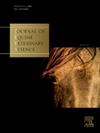对五个马术项目的马匹进行福利评估。
IF 1.3
3区 农林科学
Q2 VETERINARY SCIENCES
引用次数: 0
摘要
目前,塞尔维亚有关马匹福利的信息很少。这项研究的目的是确定在马厩饲养系统中饲养的五类不同马匹(西部骑术马、骑术学校马、休闲马、跳跃马和耐力马)可能遇到的主要福利问题。采用动物福利指标(AWIN)马匹福利评估方案对 50 匹马进行了评估。已确定的马匹福利问题包括:饲养箱尺寸不足(52%,26/50)、铺垫材料数量不足(34%,17/50)、铺垫材料脏污(52%,26/50)、体表改变(68%,34/50)、跛足(16%,8/50)、刻板行为(28%,14/50)以及对人类存在的负面反应(24%,12/50)。骑术学校马匹的脱发、皮损、嘴角硬斑、马龇牙量表和人与动物关系测试的平均得分明显高于其他学校马匹(P<0.05)。本文章由计算机程序翻译,如有差异,请以英文原文为准。
Welfare assessment of stabled horses in five equestrian disciplines
In Serbia, at present, there is very little information about the welfare of horses. The aim of this study was to identify the main welfare issues likely to be encountered in five different categories of horses (Western riding horses, riding school horses, leisure horses, jumping horses, and endurance horses) kept in stabled housing systems. A total of 50 horses were evaluated using the Animal Welfare Indicator (AWIN) welfare assessment protocol for horses. Identified welfare issues in horses were inadequate box dimensions (52%, 26/50), insufficient quantity of bedding material (34%, 17/50), dirty bedding material (52%, 26/50), integument alterations (68%, 34/50), lameness (16%, 8/50), stereotypic behaviors (28%, 14/50), and negative response to human presence (24%, 12/50). The mean scores for alopecia, skin lesions, hardened spots at the mouth corners, horse grimace scale, and human-animal relationship tests in riding school horses were significantly higher (P<0.05; P<0.001) than for other categories of horses. The leisure horses exercised significantly less often (P<0.001) compared with other categories of horses. Additionally, important risks to welfare, identified across all groups of horses, were insufficient social interaction where 14 horses (28%) were unable to have any visual or physical contact with other horses. The results of this study provide the first analysis and valuable insight into the impact of the individual stable housing system on the welfare of different categories of horses in the Balkan region.
求助全文
通过发布文献求助,成功后即可免费获取论文全文。
去求助
来源期刊

Journal of Equine Veterinary Science
农林科学-兽医学
CiteScore
2.70
自引率
7.70%
发文量
249
审稿时长
77 days
期刊介绍:
Journal of Equine Veterinary Science (JEVS) is an international publication designed for the practicing equine veterinarian, equine researcher, and other equine health care specialist. Published monthly, each issue of JEVS includes original research, reviews, case reports, short communications, and clinical techniques from leaders in the equine veterinary field, covering such topics as laminitis, reproduction, infectious disease, parasitology, behavior, podology, internal medicine, surgery and nutrition.
 求助内容:
求助内容: 应助结果提醒方式:
应助结果提醒方式:


